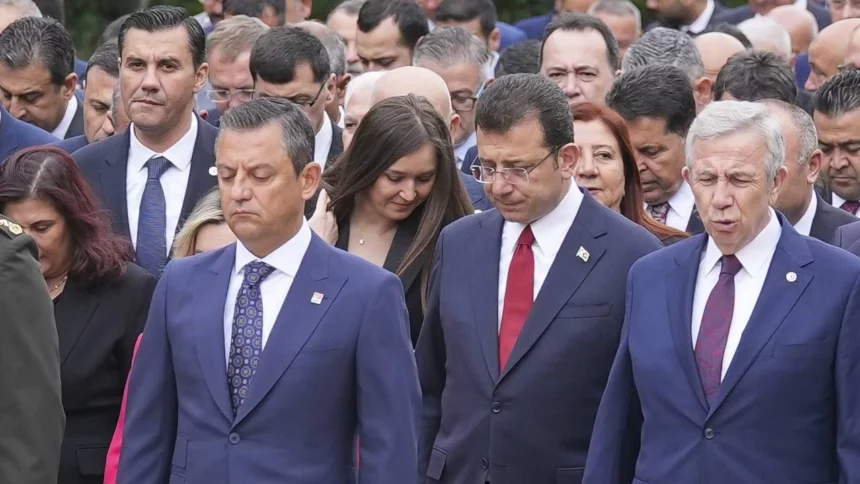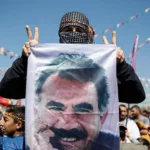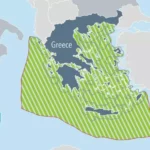As Turkey prepares for its next presidential election, the Kurdish peace process has once again thrust the Kurdish issue into the center of national politics, stirring intense debate within the country’s main opposition party, the Republican People’s Party (CHP). President Recep Tayyip Erdoğan’s government has skillfully leveraged this issue to create discord within the CHP by initiating a new phase in the Kurdish peace process. This encompasses symbolic gestures, including the support for Nationalist Movement Party (MHP) leader Devlet Bahçeli’s engagement with pro-Kurdish Democratic Equality and Freedom Party (DEM) members, as well as punitive measures, such as the arrest of Esenyurt Mayor Ahmet Özer. The CHP faces a challenging situation as it attempts to reconcile nationalist expectations with the aspirations of moderate and Kurdish-leaning voters, complicating its pursuit of a presidential candidate.
The situation is further complicated by CHP leader Özgür Özel, whose measured response to Özer’s arrest has elicited criticism from within the party. Certain members assert that Özel is influenced by Erdoğan, especially via a “normalization process” aimed at aligning the CHP’s policies with the government’s agenda. This perceived reluctance to confront the government on issues of judicial overreach, especially in cases like Özer’s arrest, has created additional division within the party and fueled skepticism about Özel’s leadership.
Key CHP figures, including Istanbul Mayor Ekrem İmamoğlu and Ankara Mayor Mansur Yavaş, represent distinct factions within the party. İmamoğlu embodies a more inclusive approach, seeking to attract diverse demographics, while Yavaş appeals to the CHP’s traditional nationalist core. Erdoğan’s tactics, along with Özel’s perceived compliance, have deepened the divide between these two camps, forcing the CHP to confront its internal rifts over the Kurdish issue as it considers its broader strategy for challenging Erdoğan’s administration.
Erdoğan’s Role in Sowing Division
One of the goals of President Erdoğan’s calculated actions toward the Kurdish issue is to undermine opposition unity while preserving his own nationalist support. Recent moves by his government, including allowing Bahçeli to shake hands symbolically with DEM deputies but also detaining opposition leaders like Ahmet Özer, the mayor of Esenyurt’s CHP, have sent conflicting messages, enabling Erdoğan to win over both nationalist and reformist elements of the populace. Erdoğan’s crackdown on pro-Kurdish opposition leaders and backing for Bahçeli’s ostentatiously accommodating moves have further polarized the CHP on the Kurdish issue.
The arrest of Ahmet Özer, a CHP mayor in Esenyurt, has heightened this tension. Özer’s detention highlights Erdoğan’s use of judicial power to deter the CHP from adopting more inclusive policies, which many see as a message to opposition leaders thinking about reaching out to Kurdish communities. This tactic has amplified divisions within the CHP, as the party must weigh the risks of a moderate stance on the Kurdish issue against the loyalty of its nationalist base.
Bahçeli’s Gesture and the Kurdish Peace Process
On October 1, 2024, MHP leader Devlet Bahçeli made an unprecedented move by shaking hands with DEM deputies, signalling a possible shift toward a new Kurdish peace process. This action, however primarily symbolic, compelled the CHP to reassess its position on the Kurdish issue. Bahçeli’s unforeseen engagement afforded Erdoğan a mechanism to undermine the opposition by placing the CHP in a precarious situation. Moderate CHP members perceive this as an opportunity to broaden their electoral base, whilst the party’s nationalist faction is apprehensive, concerned that collaboration with Kurdish parties may estrange conventional voters.
Özgür Özel’s Leadership and Allegations of Weak Opposition
Özgür Özel’s position as the party leader adds to the complexity inside the CHP. Within the party, he has come under fire for his calm, non-aggressive approach to Esenyurt Mayor Ahmet Özer’s detention. Since they saw Özer’s detention as a politically motivated move by Erdoğan’s government, many CHP members anticipated a more forceful denunciation of the incident. However, Özel’s taciturn demeanour has stoked rumours that he is hesitant to take on the government head-on, possibly as a result of pressure from the “normalization process” that some claim brings the CHP’s policies closer to Erdoğan’s agenda.
This lack of strong criticism has deepened distrust within the party, with some members fearing that Özel’s leadership lacks the boldness needed to resist Erdoğan’s tactics. Critics argue that by not openly challenging the arrest of Özer, Özel has missed another opportunity to rally the opposition and assert the CHP’s stance against perceived government overreach. Instead, his restrained response has led to internal divisions and raised doubts about his commitment to the party’s foundational principles of justice and democratic integrity.
Ekrem İmamoğlu: A Call for Unity and Inclusivity
Ekrem İmamoğlu, Istanbul’s mayor, represents the CHP’s reformist wing, which advocates for a more inclusive platform. On October 29, 2024, during Republic Day celebrations in Yenikapı, İmamoğlu delivered a speech that hinted at a potential presidential candidacy, declaring, “Their time is over. The day has come. We are ready for this duty,” and signaling his readiness to challenge the current political leadership. In his address, İmamoğlu emphasized the need to end a system that disregards the will of the people, advocating for the restoration of merit-based governance and social justice.
This speech comes amid ongoing legal and political challenges for İmamoğlu. In December 2023, he was sentenced to two years and seven months in prison and banned from holding political office on charges of allegedly insulting members of Turkey’s Supreme Electoral Council. Although İmamoğlu has appealed the verdict, his case remains under review. Despite these challenges, his recent remarks indicate that he remains a significant figure in Turkish politics, potentially positioning himself as a key contender in future presidential elections.
İmamoğlu’s inclusive rhetoric and appeal to social justice resonate with those within the CHP who favor a broader, more diverse political base, including moderate and Kurdish voters. His stance, however, risks alienating the CHP’s nationalist faction, which views any engagement with Kurdish issues as a potential threat to national unity. İmamoğlu’s challenge lies in maintaining his appeal to new voter demographics without losing the support of traditional nationalists.
Mansur Yavaş: A Rising Nationalist Leader
Recent developments in Turkey’s political landscape indicate a potential shift in power dynamics, with nationalist figures like Mansur Yavaş gaining prominence. Yavaş, the current Mayor of Ankara and a member of the CHP, has seen a rise in popularity, reflecting growing public support for alternative leadership. In the 2024 local elections, the CHP achieved significant victories, securing major cities such as Istanbul and Ankara. Yavaş’s effective governance in Ankara has been a key factor in bolstering the CHP’s appeal. His background, which includes previous affiliations with nationalist parties, enables him to connect with a broad spectrum of voters, including those with nationalist inclinations.
Public opinion polls further underscore this trend. A survey by the Toplum Çalışmaları Enstitüsü revealed that Yavaş leads as the most popular potential presidential candidate, scoring 5.9 out of 10, surpassing both Selçuk Bayraktar and President Erdoğan. These developments suggest a possible turning point in Turkish politics, with nationalist forces within the opposition gaining momentum. As figures like Yavaş become more vocal and influential, President Erdoğan’s political future faces new challenges, indicating a dynamic and evolving political environment in Turkey.
Yavaş’s nationalist approach has the potential to attract voters from the AKP and MHP, as well as other conservative and nationalist voters, positioning him as a formidable candidate. This potential to pull support from Erdoğan’s traditional voter base is one of the primary reasons Erdoğan sees Yavaş as a more dangerous contender than İmamoğlu. While İmamoğlu’s appeal is strong among moderates and urban voters, Yavaş’s nationalist credentials make him a compelling option for those disillusioned with Erdoğan but wary of a significant political shift. This dual appeal across the political spectrum places Yavaş in a unique position to consolidate support from both traditional CHP voters and disillusioned nationalists.
The Impact of Esenyurt Mayor Özer’s Arrest
The implications of Özer’s arrest extend beyond his immediate circle, placing additional pressure on CHP members sympathetic to Kurdish concerns. His arrest serves as a stark reminder of Erdoğan’s willingness to leverage judicial power against political opponents, particularly those perceived as challenging the state’s stance on Kurdish issues.
Furthermore, Özer’s arrest has intensified the ongoing debate within the CHP over how the party should approach the Kurdish issue. The party’s nationalist faction, wary of any association with Kurdish groups or policies that might be perceived as sympathetic to Kurdish autonomy, sees Özer’s detention as a cautionary tale. Nationalists within the CHP argue that engaging with Kurdish concerns could alienate traditional CHP voters and expose the party to government-led crackdowns, potentially weakening its position in the run-up to the presidential election.
On the other hand, members of the CHP’s reformist wing view Özer’s arrest as a troubling sign of authoritarianism and an attack on democratic principles. They argue that bowing to Erdoğan’s tactics would only embolden his administration, allowing it to dictate the opposition’s policy choices through intimidation. For these members, Özer’s arrest is not just an isolated incident but a symbol of the broader struggle for democratic reform and human rights in Turkey. They contend that the CHP should resist pressure to abandon its inclusive policies and instead double down on its commitment to justice and equality, even if this stance risks further confrontations with the government.
Özer’s arrest thus reinforces the internal rift within the CHP, amplifying tensions between its nationalist and reformist factions. For the nationalists, the incident underscores the risks associated with engaging with Kurdish issues, leading them to push for a more cautious approach that avoids potential government retaliation. Meanwhile, the reformists see Özer’s arrest as a rallying point, a moment that calls for stronger resistance against government overreach and a reaffirmation of the CHP’s commitment to a democratic Turkey that includes all voices, including those of the Kurdish population.
This divide highlights a fundamental dilemma within the CHP. As the party considers its path forward, it must decide whether to adopt a pragmatic approach that prioritizes national unity and minimizes the risk of government crackdowns, or to take a principled stance that champions inclusivity and justice, even if this stance provokes further government action. Özer’s arrest has become emblematic of the challenges facing the CHP as it attempts to navigate Erdoğan’s divisive strategies while staying true to its values and preparing for a high-stakes election.
Strategic Dilemmas Facing the CHP
The Kurdish peace process has exposed the broader strategic dilemma within the CHP. The party must choose between an inclusive approach that could attract a larger, more diverse voter base and a nationalist stance that preserves its traditional identity. Each choice carries significant risks and potential rewards. A reformist approach, represented by figures like İmamoğlu, could broaden the CHP’s appeal, particularly among urban and Kurdish voters, but risks alienating its core nationalists. Conversely, a nationalist approach, represented by Yavaş, might consolidate the CHP’s traditional support but limit its reach among progressive and moderate voters. The presence of Özgür Özel, seen by some as cautious in challenging Erdoğan, further complicates these choices, as his restrained response to Özer’s arrest fuels doubts about his commitment to a strong opposition.
Mansur Yavaş’s Ultimatum and the Risk of a Split Opposition
Mansur Yavaş, the mayor of Ankara, responded to the increasing rumours regarding his potential presidential candidacy on September 26, 2024. Mr. Yavaş declared during a press conference that “we will be a candidate if our party nominates us.” The party’s candidate selection policies are unambiguous. Although it may appear to be a deference to the CHP’s decision-making process, this statement is significant and suggests a broader strategic dilemma within the party. Yavaş’s potential departure from the CHP to run independently or with a new political faction could substantially alter the election landscape if the party fails to nominate him.
The CHP is placed in a difficult position as a result of this ultimatum. Yavaş, who retains substantial appeal among nationalist and conservative voters, would likely attract a substantial voter base from within the CHP as well as from disillusioned AKP and MHP supporters if he decides to break away from the party. Such a split could result in a divided opposition, with Yavaş running as a strong nationalist alternative and likely drawing votes away from other opposition candidates, particularly if the CHP nominates a more moderate figure like İmamoğlu. This fragmentation of the opposition vote would make Erdoğan’s path to victory significantly easier, as it would prevent a united opposition from consolidating around a single candidate.
Yavaş’s appeal extends beyond traditional CHP supporters, reaching conservative and nationalist voters who may be looking for a viable alternative to Erdoğan but are hesitant to back candidates perceived as too liberal or pro-Kurdish. If he runs independently, Yavaş could siphon votes from across the political spectrum, effectively dividing the anti-Erdoğan electorate and diminishing the opposition’s chances in the upcoming election. This potential split within the opposition, a scenario Erdoğan would undoubtedly favor, illustrates the high stakes of the CHP’s candidate selection process.
Conclusion: Navigating Erdoğan’s Divisive Strategy
Through his support of the new Kurdish peace process and actions such as the arrest of Esenyurt Mayor Ahmet Özer, President Erdoğan has effectively deepened the divisions within the CHP, forcing the party to navigate a challenging political landscape. By leveraging symbolic gestures, influencing CHP leadership indirectly through Özgür Özel’s cautious approach, and implementing punitive actions, Erdoğan has placed the CHP in a precarious position, compelling it to balance nationalist expectations with the desire to appeal to a broader electorate.
The CHP’s approach to the Kurdish issue and its selection of a presidential candidate will be pivotal in determining its success in unifying a fractured opposition and challenging Erdoğan’s administration. Whether the party can balance these competing pressures and present a coherent vision for Turkey’s future will shape the country’s political trajectory in the years to come. The Kurdish issue, long a source of contention, has once again become a catalyst that could either strengthen the CHP’s appeal or deepen the rifts that have historically limited its influence in Turkish politics.
By: NAT Editorial Team



